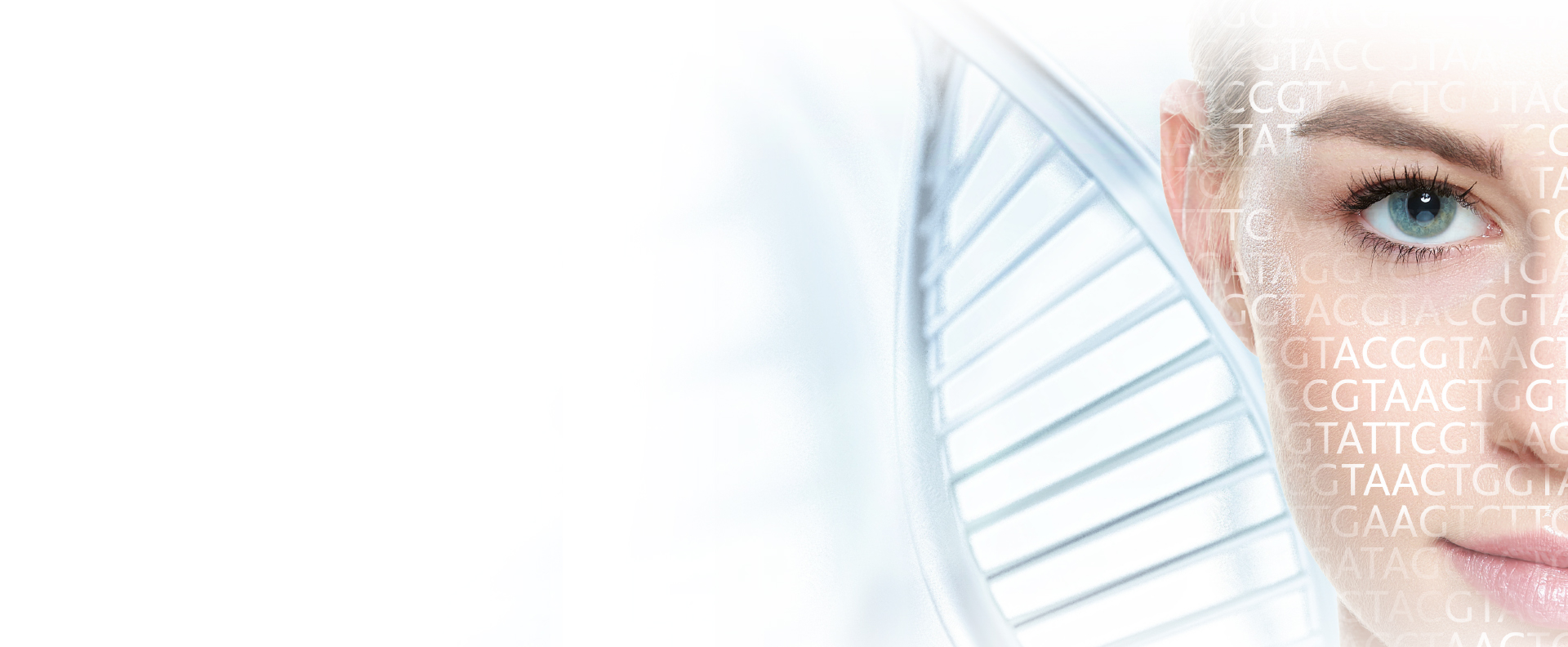IllnessOro-facio-digital syndrome, differential diagnosis
Summary
Comprehensive differential diagnostic panel for Oro-facio-digital syndrome comprising 10 core candidate genes and altogether 15 curated genes according to the clinical signs
| Locus type | Count |
|---|---|
| Gen | 12 |
37,2 kb (Extended panel: incl. additional genes)
- EDTA-anticoagulated blood (3-5 ml)
NGS +
Loci
Gen
| Name | Exon Length (bp) | OMIM-G | Referenz-Seq. | Heredity |
|---|---|---|---|---|
| C2CD3 | 5892 | NM_015531.6 | AR | |
| DDX59 | 1860 | NM_001031725.6 | AR | |
| INTU | 2829 | NM_015693.4 | AR | |
| NEK1 | 3777 | NM_012224.4 | AR | |
| OFD1 | 3039 | NM_003611.3 | XL | |
| PDE6D | 453 | NM_002601.4 | AR | |
| SCLT1 | 2067 | NM_144643.4 | AR | |
| TCTN3 | 1824 | NM_015631.6 | AR | |
| TMEM216 | 438 | NM_001173990.3 | AR | |
| TMEM231 | 1110 | NM_001077416.2 | AR | |
| CPLANE1 | 9864 | NM_023073.4 | AR | |
| KIF7 | 4032 | NM_198525.3 | AR |
Informations about the disease
Oro-facio-digital syndrome (OFDS) represents a group of related disorders that affect the development of the oral cavity, facial features and digits. The OFDS symptoms vary widely. Most forms are also associated with brain abnormalities and some degree of intellectual disability. Abnormalities of the oral cavity include a split and lobulated tongue as well as non-cancerous nodules on the tongue. Affected individuals may also have additional, missing or defective teeth, cleft palate and hyperplastic frenulae. Common facial features include cleft lip, a broad nose with a wide, flat nasal bridge and hypertelorism. Abnormalities of the fingers and toes occur as syndactyly, brachydactyly, clinodactyly and/or polydactyly. Rarer features help distinguish the different forms. The most common form of oral-facial-digital syndrome, type I, is associated with polycystic kidney disease. Other forms are characterized by neurological problems, particularly changes in brain structure, bone abnormalities, visual disturbances and heart defects. The OFD1 gene is associated with OFDS. Mutations in this gene cause OFDS type I; types I and VII cannot be distinguished clinically. OFDS type I is inherited in an X-linked dominant pattern. Most other forms of oral-facial-digital syndrome are inherited in an autosomal recessive manner. Because the molecular genetic yield is less than 85%, a negative DNA test result does not constitute exclusion of the clinical suspicion.
Reference: https://www.ncbi.nlm.nih.gov/books/NBK1188/
- Alias: Oral-facial-digital syndrome
- Alias: Oro-facio-digital syndrome
- Alias: Dysplasia linguofacialis
- Alias: Mohr-Majewski syndrome (TCTN3)
- Alias: Orodigitofacial dysostosis
- Alias: Orodigitofacial syndrome
- Alias: Orofaciodigital syndrome
- Allelic: Acrocallosal syndrome (KIF7)
- Allelic: Amyotrophic lateral sclerosis, susceptibility to, 2 (NEK1
- Allelic: Hydrolethalus syndrome 2 (KIF7)
- Allelic: Retinitis pigmentosa 23 (OFD1)
- Al-Gazali-Bakalinova syndrome (KIF7)
- Joubert syndrome 10 (OFD1)
- Joubert syndrome 12 (KIF7)
- Joubert syndrome 18 (TCTN3)
- Joubert syndrome 2 (TMEM216)
- Joubert syndrome 20 (TMEM231)
- Joubert syndrome 22 (PDE6D)
- Joubert syndrome 29 (TMEM107)
- Joubert syndrome 38 (KIAA0753)
- Meckel syndrome 11 (TMEM231)
- Meckel syndrome 13 (TMEM107)
- Meckel syndrome 2 (TMEM216)
- Orofaciodigital syndrome I (OFD1)
- Orofaciodigital syndrome IV (TCTN3)
- Orofaciodigital syndrome IX (SLCT1)
- Orofaciodigital syndrome V (DDX59)
- Orofaciodigital syndrome VI (CPLANE1 syn. C5orf42)
- Orofaciodigital syndrome XIV (C2CD3)
- Orofaciodigital syndrome XV (KIAA0753)
- Orofaciodigital syndrome XVI (TMEM107)
- Orofaciodigital syndrome XVII (INTU)
- Orofaciodigital syndrome XVIII (IFT57)
- Short-rib thoracic dysplasia 20 with polydactyly (INTU)
- Short-rib thoracic dysplasia 21 without polydactyly (KIAA0753)
- Short-rib thoracic dysplasia 6 with/-out polydactyly (NEK1)
- Simpson-Golabi-Behmel syndrome, type 2 (OFD1)
- AR
- XL
- Multiple OMIM-Ps
Bioinformatics and clinical interpretation
Test-Stärken
- DAkkS-akkreditiertes Labor
- EU-Richtlinie für IVD in Umsetzung
- Qualitäts-kontrolliert arbeitendes Personal
- Leistungsstarke Sequenzierungstechnologien, fortschrittliche Target-Anreicherungsmethoden und Präzisions-Bioinformatik-Pipelines sorgen für überragende analytische Leistung
- Sorgfältige Kuratierung klinisch relevanter und wissenschaftlich begründeter Gen-Panels
- eine Vielzahl nicht Protein-kodierender Varianten, die in unseren klinischen NGS-Tests mit erfasst werden
- unser strenges Variantenklassifizierungsschema nach ACMG-Kriterien
- unser systematischer klinischer Interpretations-Workflow mit proprietärer Software ermöglicht die genaue und nachvollziehbare Verarbeitung von NGS-Daten
- unsere umfassenden klinischen Aussagen
Testeinschränkungen
- Gene mit eingeschränkter Abdeckung werden gekennzeichnet
- Gene mit kompletten oder partiellen Duplikationen werden gekennzeichnet
- es wird angenommen, dass ein Gen suboptimal abgedeckt ist, wenn >90% der Nukleotide des Gens bei einem Mapping-Qualitätsfaktor von >20 (MQ>20) nicht abgedeckt sind
- die Sensitivität der Diagnostik zur Erkennung von Varianten mit genannten Testeinschränkungen ist möglicherweise begrenzt bei:
- Gen-Konversionen
- komplexe Inversionen
- Balancierte Translokationen
- Mitochondriale Varianten
- Repeat-Expansionen, sofern nicht anders dokumentiert
- nicht kodierende Varianten, die Krankheiten verursachen, die von diesem Panel nicht mit abgedeckt werden
- niedriger Mosaik-Status
- Repeat-Blöcke von Mononukleotiden
- Indels >50bp (Insertionen-Deletionen)
- Deletionen oder Duplikationen einzelner Exons
- Varianten innerhalb von Pseudogenen
- die analytische Sensitivität kann geringer ausfallen werden, wenn die DNA nicht von amedes genetics extrahiert wurde
Laboratory requirement
Die in grün gezeigten Gene sind kuratiert und werden als Gen-Panel untersucht. Eine Erweiterung des Panels (blau gezeigte Gene, jeweils ebenfalls kuratiert) kann auf Anfrage erfolgen. Sofern unter "Erweitertes Panel" ein Minuszeichen angezeigt wird, sind nur Core-/Basis-Gene verfügbar.
Für die Anforderung einer genetischen Untersuchung senden Sie uns bitte die Krankheits-ID auf einem Überweisungsschein. Bitte die Material-Angabe beachten.
Für privat versicherte Patienten empfehlen wir einen Antrag auf Kostenübernahme bei der Krankenversicherung.
Die Untersuchung wird auch für Selbstzahler angeboten.

